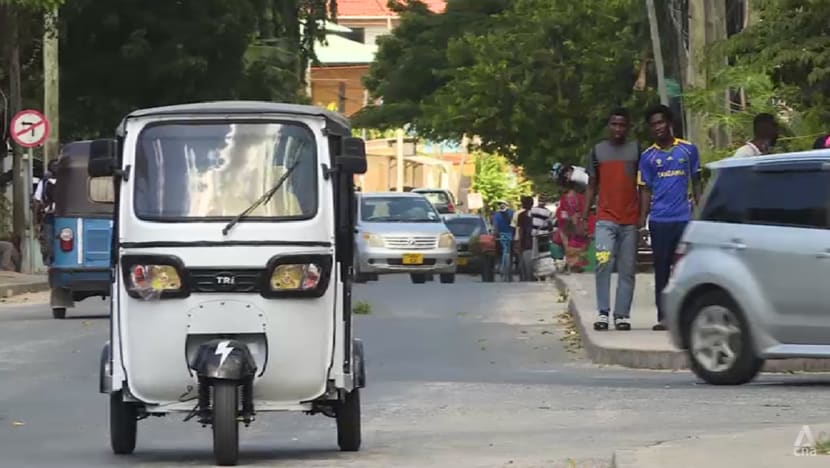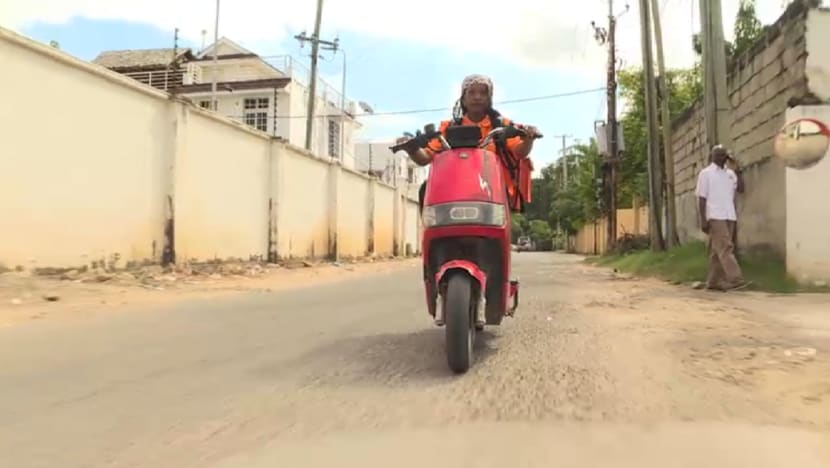Tanzania welcomes Chinese EV imports and production amid drive to transit from fossil fuels
Despite tax-free incentives on imports, Tanzania's EV industry faces other obstacles to growth, including limited funding, a shortage of technicians, and low consumer awareness.

China has been quietly driving an electric vehicle revolution in many parts of Africa, creating jobs and supporting a transition away from fossil fuels. A raft of African governments are welcoming Chinese EV imports and production, and industry experts expect to see more such vehicles on African roads.

This audio is generated by an AI tool.
DAR ES SALAAM, Tanzania: China has been quietly driving an electric vehicle revolution in many parts of Africa, creating jobs and supporting a transition away from fossil fuels.
A raft of African governments are welcoming Chinese EV imports and production, and industry experts expect to see more such vehicles on African roads.
This comes as Chinese EV brands seek new markets for expansion after being slapped by high tariffs from the United States and European Union.
Dr Stephen Dyer, co-leader of global consulting firm AlixPartners’ Greater China business and head of the firm’s Asia automotive and industrials practice, said: “It's possible now that we're at the forefront of the advent of the China age in the automotive industry globally.”
MORE EVs ON THE ROAD
The Tanzanian financial hub of Dar es Salaam, for instance, is being transformed by a surge in EVs.
Two-and-three wheelers, which currently dominate the city’s roads, are rapidly being switched out for electric mopeds.
Food delivery driver Zakhia Thabeet made the transition a few years ago as she could no longer afford paying for fuel.
“(With an electric moped), I usually don't have huge fuel expenses anymore,” she said. “It's a good vehicle that can help me, as a young person, reach my goals in life.”
The delivery company that she works for, Piki, imported 32 electric mopeds from China in 2021. The move has resulted in healthier profit margins, it said.
However, adopting EVs has not been without its challenges.
One of the main issues has been their relatively short lifespan, said observers.
Piki operations manager Andronico Chaulo said: “There are issues with its battery and overall care of the motorcycle's body, which can get damaged easily.”
Tanzania, motivated by a desire to reduce air pollution among other reasons, is among East Africa's leading countries in the switch to EVs.
There are more than 5,000 EVs on the roads – the highest number in the region, and this is expected to grow further.
Some local ride-hailing apps allow users to request for an EV, which is a cheaper option compared to regular cars with combustion engines.
In the past few years, at least 10 firms have entered Tanzania's electric mobility market.
Among them is e-mobility startup Tri, which imports parts for three-wheelers from China and assembles them in its factories.
It has sold more than 90 units so far, and has ambitions to expand across Africa.
Ms Mercy Kitomari, government relations and policy lead at Tri, said there is interest from buyers from neighbouring countries such as Malawi, the Democratic Republic of Congo, Ethiopia, and Zambia.
“They are all inquiring how we can send shipments directly to them,” she added.

LIMITED FUNDS, LOW AWARENESS
Despite tax-free incentives on imports, Tanzania's EV industry faces other obstacles to growth, including limited funding, a shortage of technicians, and low consumer awareness.
“It will take a minute for someone to believe that you can charge a vehicle for two hours and drive 100km. And they always wonder, what if I want to drive 110km?” said Ms Kitomari, adding that she helps people understand by comparing EV charging to that of a mobile phone.
“If you know your phone is dying, you will charge it, especially if you're using it for work. So it's the same thing with electric vehicles. But adaptation is a process.”
Since 2009, Beijing has offered subsidies and tax breaks to Chinese EV manufacturers, which allows them to sell their products to overseas markets relatively cheaply.
In Africa, trade in EVs is dominated by the import of components from China. But there is also increasing interest for Chinese carmakers to form local partnerships.
This has led to the creation of jobs and given a boost to efforts to build a domestic EV industry, said observers.
“As the market grows to enough volume to support local assembly operations, we typically see a step where exporters will then begin assembling what we call semi knock-down kits and then completely knock-down kits,” said Dr Dyer. A knock-down kit refers to a bundle of parts imported to assemble a product.
“And later, as the volume reaches a certain scale, you'll see the local development of an automotive ecosystem,” he told CNA’s East Asia Tonight on Friday (Jul 12).
“I expect to see that in Africa in the longer term, but probably not in the short term.”















